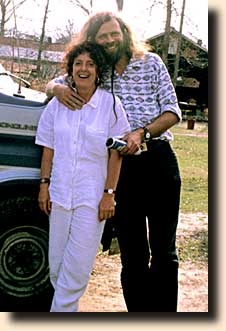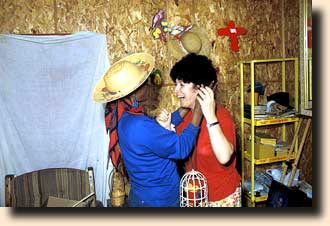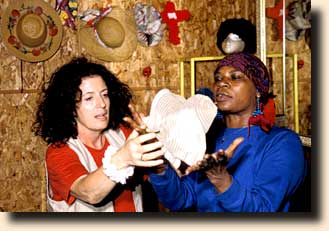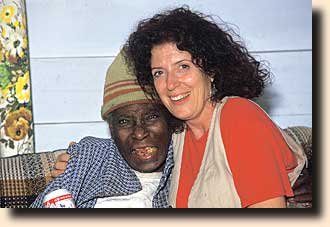

"Go where
people sleep & see if they are safe...."
My travels with
a nomad
by
Anita Roddick
Last year I crossed
the great divide, traveling through rural areas of Louisiana, Mississippi,
Alabama and Georgia for my first look at extreme poverty in America. To
be poor anywhere is always hard, but poverty in America, in a land of
such plenty, seems harder, shocking in its incongruity.
Wealth can make people
insensitive. I've always promised myself I would never let that happen
to me. Journeys like this provide me with an antidote to comfort and complacency.
They help illuminate the current state of human affairs. But I needed
the right guide, someone who can take me straight to the heart of this
forgotten stratum of society.
 I
found a guide in Jacob Holdt, a vagabond photographer. I heard about him
through a staff member at The Body Shop's U.S. head offices in Wake Forest.
I
found a guide in Jacob Holdt, a vagabond photographer. I heard about him
through a staff member at The Body Shop's U.S. head offices in Wake Forest.
Born in Denmark 40-odd
years ago, Jacob has spent the last 20 years roaming America, photographing
the rural black communities in Louisiana, Alabama, Mississippi and Georgia
where he made his first friends.
In the early 80s
he began to share these photographs with American university students,
revealing their country's other face to them. In addition to the slide
presentations, he also conducts three-hour workshops on racism. He has
visited over 270 American campuses and continues to lecture all over the
world.

A gentle force
I had never met Jacob
before this trip. I was scheduled to give a talk in New Orleans and Jacob
was journeying to meet the people he had spent time with over the last
twenty years.
Together we visited
shacks and prisons cells in the forgotten underbelly of America. When
we met, the first thing I wanted to do was hand him a bottle of Brazil
Nut Hair Conditioner. His hair was as rough as straw and he had a long,
plaited beard which he rolled up when he went into the cities.
I quickly learned
that Jacob's personality was aggressively passive. If ever he was in adversarial
situations, he would gently talk his way out of things. Once, when every
inch of our truck was filled with wayfarers, itinerants and hitchhikers
who would normally strike fear in any of us -- Jacob never passed anyone
by on the highway - I studied how softly Jacob spoke and how intently
he listened.
In our society, gentleness
is often viewed as ridiculous or insincere. Jacob showed me that nothing
is as powerful as gentleness or as persuasive as treating a person with
respect and kindness. This is how he has survived the hazards of the life
he has spent gathering the stories of the marginalized and the poor.

The power of hate
What I saw with Jacob
astounded me. I saw communities that had been excluded from society for
generations. They were sinking deeper and deeper into poverty and hopelessness
under the weight of structural racism. The hope for change, and the optimism
that I felt during the sixties when we campaigned for racial equality
had disappeared. The longer I traveled with Jacob, the more I started
to believe that there was no more hope.
I also saw the effects
of the incredible power of television -- how television is just like a
pacifier to the mind. A pale blue light flickered in the broken down shacks
24 hours a day. It seems that we have all become part of a media culture,
designed to perpetuate the myth that material wealth defines self-value
and self-worth. My insight is that racism and poverty cast the longest
shadows over America today.
While we traveled
in the truck Jacob and I talked long and hard about racism. I used to
be convinced that colour was not important in my relationships. I am constantly
checking myself: Do I understand the definition of racism? I think racial
prejudice is like a hair across your cheek -- you can't see it, you can't
find it - you just keep brushing at it with your fingers. It frightens
me, and never more than when I see the impact it has on peoples' lives.

Poverty shames
us all
Poverty in the face
of such affluence is scandalous. If companies invested in communities
in need, families could work together and skills could be protected. I
tried to see if The Body Shop could set up a small-scale economic initiative
within the communities that we visited.
Although this particular
initiative failed, I believe more strongly now, more than ever, that we
must continue the fight for community-based businesses. It is these micro
enterprises, these informal networks out there which form a rag tag front
line in the worldwide struggle to end poverty.
The Body Shop magazine
distributed to stores and customers worldwide.
October 1995, Gobsmack